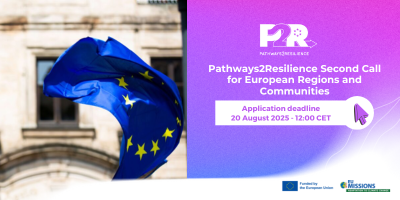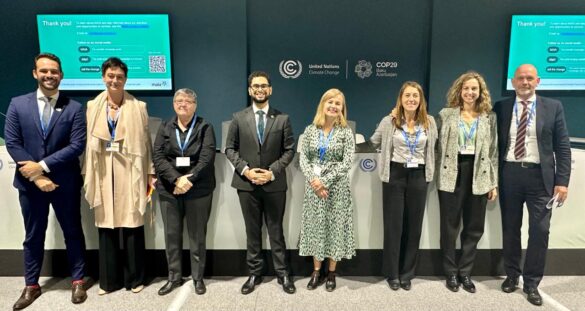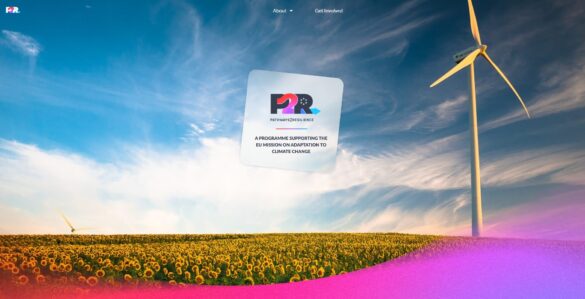P2R contributes to the objectives of the Mission and of the Adaptation Strategy by helping the regions strengthen their climate resilience by:
- Mobilising regional interests and networks to leverage political commitment towards the Mission Adaptation, elevate the ambition and capability of regional public administrations and connect innovation agendas.
- Triggering wide engagement of citizens and diverse stakeholders in the co-creation of these transformative climate resilience pathways in a way that builds on the best available expertise and multiple understandings of current and future climate risks and opportunities, fosters local ownership and ensures long-term impact.
- Facilitating learning and capability development within and across networked regional cohorts and increasing knowledge on adaptation options across different Key Community Systems (KCS), tailor-made to local challenges and needs.
- Boost enabling conditions, including funding and financing, to develop, test and up-scale transformative innovative solutions that increase local climate resilience.
-
The role of Regions4 in P2R
- Support the project’s development of resources and services to accelerate transformative and resilient change along the Regional Resilience Journey framework for Regions4 regional members to become lead regions in climate resilience action.
- Support the work to mobilise regions for the activities of the Pathways2Resilience project, in particular the two calls for proposals that will be launched and managed by the project.
- Link the regional network to the P2R project to enable peer learning, technical exchanges, training activities and cooperation opportunities.
- Support the outreach and communication activities of the project, in particular towards networks, institutions and initiatives at the EU level.
- Visit the P2R Project website here.
Regions4 – Partner in the EU Mission on Adaptation to Climate Change
To sustain Regions4 shift towards supporting its members to implement the Regions4/Race to Resilience commitments, Regions4 has varied its sources of income in 2022 and applied alongside other partners to project implementation funding proposals to support regional governments in putting in practice efficient and effective adaptation pathways and solutions.
Regions4 is now part of two consortiums that have been granted funding under the EU Mission on Adaptation to Climate Change Horizon Europe Work Programme: Maximising the Impact and Synergy of European Climate Change Research and Innovation (MAIA) and Pathways2Resilience (P2R).
Through these projects, Regions4 European members will be able to benefit from systematised research sources, funding opportunities, and guidance in developing their climate resilience action plans, and at the same time, Regions4 will democratise the knowledge and tools with the regions outside the EU to also advance their climate action and resilience.
>>> Learn more about the EU Mission on Adaptation here.
Discover this project
Pathways2Resilience contributes to the objectives of the Mission and of the Adaptation Strategy by helping the regions to:
-
- Better understand their climate risks.
-
- Develop their pathways to be better prepared and cope with the changing climate.
-
- Test and deploy innovative solutions needed to build resilience.
The 1st and 2nd calls aim to provide 40/60 regions and communities with financial support through subgrant agreements, up to a maximum amount of 210,000€ for each region, along with supporting services and capacity-building activities for subgrants lasting up to 18 months.
The selection process will prioritise regions/communities with heightened vulnerability and low adaptive capacity to climate change impacts. This call aims to put together a diverse and inclusive portfolio of regions, ensuring a comprehensive validation of the P2R framework.
The RRJ framework
The Regional Resilience Journey (RRJ) is an adaptable framework for regions and communities that wish to transition to climate resilience through a transformational adaptation approach. It helps regions to flourish in their future climates, by moving beyond reactive and incremental adaptation of existing systems. Instead, it seeks to bring about systems change where this is needed to close the adaptation gap and deliver long-term prosperity in the face of climate change.
The framework provides step-by-step guidance, a set of activities, tools and milestones that allows regions at all maturity levels to either produce their first climate resilience plans and intervention portfolios or to improve the existing ones by applying a systemic approach, just transition principles and by harnessing transformative innovation.

The Regional Resilience Journey (RRJ) framework
A systemic approach to accelerating climate resilience
Aiming at transformational adaptation, the RRJ inherently supports a systemic or systems approach, which, instead of breaking down the complexities of climate resilience to be considered as separate parts, encourages understanding and addressing this complexity with all its relevant parts and relationships in its entirety.
The RRJ should be applied taking into account the local context and building on what has already been achieved or is in motion. The RRJ should build on already developed strategies, revising and revisiting where relevant.
It is not necessary to use the RRJ as a whole new methodology, starting from scratch.
The RRJ approach ultimately provides the regions with the tools and methodologies to collect the necessary information to use the RRJ itself in the most strategic way possible, recognising that the local stakeholders are often the most knowledgeable on their own needs.
A just transition to climate resilience
The RRJ is designed to support regions and communities in a just transition to climate change, having integrated a range of principles, processes and practices that aim to ensure that no people, workers, places, sectors, countries or regions are left behind in the transition. As suggested by the IPCC (2022) regarding just transitions, it stresses the need for targeted and proactive measures to ensure that any negative social, environmental or economic impacts of economy-wide transitions are minimised, while benefits are maximised for those disproportionately affected.
Adaptation Investment Cycle
The Adaptation Investment Cycle helps to mobilise finance and ensure that the Regional Resilience Journey leads to bankable projects (i.e. those that meet the conditions required by the financier to finance a project).
The consortium has developed the Adaptation Investment Cycle – an iterative, 6-step process to develop Adaptation Investment Plans, designed to be completed as part of the Regional Resilience Journey.
The Cycle develops the financial aspects of a Climate Resilience Strategy from the identification of adaptation needs and barriers to finance all the way to the implementation and monitoring of efficient adaptation projects.

The Adaptation Investment Cycle (AIC)
Pathways2Resilience will be developing detailed guidance, resources, and templates to support the successful regions in applying the Adaptation Investment Cycle.
In the context of Pathways2Resilience’s work on regional adaptation finance, a Practitioner Finance Expert Working Group was assembled, acting as a liaison between regions and the broader financial assistance of Pathways2Resilience partners.
In addition, Pathways2Resilience will be developing a programme of training and capacity building, as well as working in depth with 9 regions across all levels of Maturity to provide tailored and targeted support.
Financial sources, instruments and best practice case studies to support financing regional adaptation
Pathways2Resilience has built a catalogue of 57 sources (institutions that provide finance for adaptation) and 78 financial instruments (mechanisms that enable the transfer of funds) for regions to use to support their adaptation efforts.
The catalogue includes a visual overview of sources and instruments, as well as detailed information on each, such as advantages and drawbacks, and key considerations for their use, as well as relevance to the Mission’s Key Community Systems.
In addition, the catalogue includes 169 case studies of public and private adaptation relevant to European regions. The elements of the catalogue can be filtered to meet your needs (e.g. by Key Community Systems, types of actors, typical funding sizes, financing strategies or hazards).
The catalogue can be used in isolation, but it has also been designed to support the P2R Adaptation Investment Cycle and help the development of Regional Climate Resilience Investment Plans.
A draft of the catalogue is available for download on the website.
The catalogue will continue to be developed and revised throughout the lifetime of the project. In addition, as part of the Mission, Pathways2Resilience is working with CLIMATEFIT – a project using Financing and Investment Taskforces in 20 Territories to create investment strategies, concrete and scalable investment plans, and bankable transformational investment cases. Together, the teams from both projects will develop and expand the catalogue. Planned enhancements include refining and expanding the definitions of sources and instruments, and the incorporation of an additional set of detailed case studies on financial instruments developed by CLIMATEFIT. We will also be hosting CLIMATEFIT’s more detailed deep-dive case studies on instruments when they become available.
P2R Achievements 2023-2024 and next steps for 2025-2027
-
- We selected the first cohort of 39 regions for the P2R programme that will receive support over 18 months:
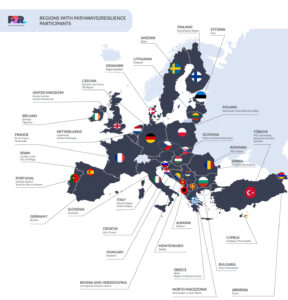
-
- Regions4 contributed to this guidance and provided the following case studies in cooperation with Scotland and the region of Catalonia:
-
- Case Study: Adaptation Scotland Guide to Adaptation Climate Finance
-
- Case study: Catalan Climate Fund: Using New Taxes to Fund Mitigation and Adaptation Activities
-
- Regions4 contributed to this guidance and provided the following case studies in cooperation with Scotland and the region of Catalonia:
-
- We have developed a training programme for the 39 P2R regions.
-
- We are in the process of establishing cross-mission exchange mechanisms, in collaboration with MIP4ADAPT/EC, and in the context of the Mission Adaptation’s FUTURIUMs Platform and their Thematic Working Groups (TWGs) and Communities of Practice (CoP), including:
-
- 4 Deep Dives facilitating expert exchanges around Key Enabling Conditions (Finance & resources, Governance and Innovation, Behavioural Change, Knowledge & Data) linking in particular to other relevant Mission Adaptation projects (1-2 meetings/year, + off-line work).
-
- 10 Innovation Practice Groups facilitating exchanges of knowledge and experiences amongst regions on 4 Key Enabling Conditions and 6 Key Community Systems, also inviting interested regions (3 meetings/year).
-
- We are in the process of establishing cross-mission exchange mechanisms, in collaboration with MIP4ADAPT/EC, and in the context of the Mission Adaptation’s FUTURIUMs Platform and their Thematic Working Groups (TWGs) and Communities of Practice (CoP), including:
Innovation Practice Groups (IPGs) related to Key Enabling Conditions (KECs):
-
- Knowledge and Data
-
- Governance, Engagement & Collaboration
-
- Behavioural Change & Empowerment
-
- Finance & Resources
Innovation Practice Groups (IPGs) related to Key Community Systems (KCSs):
-
- Ecosystems & Nature-Based Solutions
-
- Water Management
-
- Critical Infrastructure
-
- Land Use & Food Systems
-
- Health & Well-Being
-
- Local Economic Systems
Opportunities for European regions in 2025
- Second Call for Grants – NOW CLOSED!
We will select 61 regions to work on in 2026 and the 1st semester of 2027. Find out more information here.
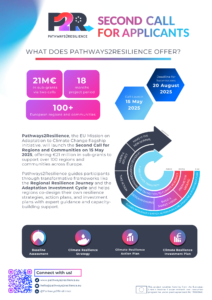
- Innovation Practice Groups
Knowledge exchange across ‘Innovation Practice Groups’ (IPG): The 10 IPGs will focus on topics such as Key Enabling Conditions and Key Community Systems. Find out more information here.

The 10 IPGs session schedule:
>10-14 March 2025 – 1st IPGs Week (10 sessions – 1.5h each)
> 2-6 June 2025 – 2nd IPGs Week (9 sessions – 1.5h each)
> 20-24 October 2025 – 3rd IPGs Week (10 sessions – 1.5h each)
Pathways2Resilience invites you to 8 online sessions exploring a key topic for your climate adaptation efforts. Exchange with and learn from peers, experts, and practitioners on finance, governance, data, infrastructure, land use, community engagement and more. If you work in a regional government or a local coalition involved in climate adaptation, these sessions are for you!
Resources to explore:
- Training sessions and tools: Some of the resources are public on the P2R website
- The P2R Toolbox
- The P2R Visual platform
Stay Tuned

Related Events
Join us!
We welcome our regions members to participate in EU Mission Horizon Europe Projects on Climate Change Adaptation
Do not hesitate to contact us!
Mariana Trinidad Corvaro, responsible
of this project:

Mariana Trinidad Corvaro
Climate and Resilience Project Manager
mcorvaro@regions4.org

